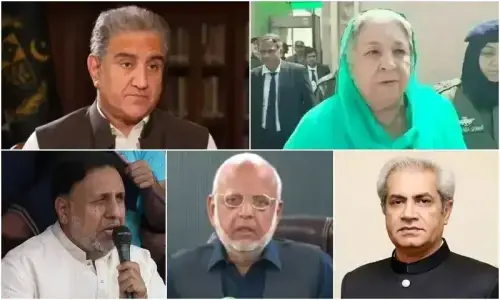THE Pakistan army chief’s speech on Sept 6, Defence Day, highlighted the security threats which Pakistan continues to face from India 50 years after the 1965 war. That war lasted 17 days. If, God forbid, war was to break out today, it may last only 17 hours. Cross-border exchanges or incursions could easily escalate to general conventional warfare. This, in turn, could rapidly cross the nuclear threshold. The possibilities of such escalation have been widely analysed and validated.
When the Cuban missile crisis drove home the danger of mutual annihilation, the US and the Soviet Union rapidly initiated a process of bilateral and global strategic arms control. Pakistan and India have had several equivalents of the Cuban missile crisis: in 1987 (India’s Brass Tacks military ‘exercises’); 1990 (the last Kashmir insurgency); 1998 (the nuclear explosions); 1999 (the Kargil conflict); and 2002 (the year long border mobilisation by India and then Pakistan). Yet, no serious effort has ever been made to contain and reduce the danger of a conflict whose lethal implications for the two countries and their peoples have become graver by the day.
For its part, Pakistan has advanced a series of proposals for arms control, such as the post-1974 South Asia nuclear weapon-free zone and the post-1998 Pakistan-India strategic restraint regime. India has consistently spurned these proposals. Only a few ‘confidence-building measures’ have been agreed: prohibiting attacks on nuclear facilities and notification of military exercises and ballistic missile tests.
Historically, the prospects of arms control in South Asia have been severely retarded by the discriminatory restraints imposed against Pakistan by the US and Western powers, even as they tolerated and often encouraged Indian nuclear and conventional arms proliferation. Canada’s supply of a heavy water reactor — CIRRUS — to India outside international safeguards and US transfer of missile technology, in the guise of helping India’s space programme, are two well-known examples.
Prospects of arms control in South Asia have been retarded by the discriminatory restraints on Pakistan.
For a time, Pakistan was able to induct a semblance of equity into the security agenda. In the early 1990s, when India was battling the Kashmiri insurgency and Pakistan had embarked on nuclear enrichment, Washington agreed to promote a broad and balanced agenda for Pakistan-India talks. Again, in 1998, after Pakistan’s reciprocal nuclear tests established nuclear parity, the parallel dialogue conducted by the US with Pakistan and India had an identical agenda, including Kashmir and nuclear and conventional arms control.
American discrimination against Pakistan was revived and institutionalised in 2007 when the then US secretary of state, Condoleeza Rice, proclaimed Washington’s decision to “de-hyphenate” US policies towards India and Pakistan. This decision followed an American determination to build India as a bulwark against China’s rising power. Washington entered into a formal defence pact and a civil nuclear cooperation agreement with India, notwithstanding the Treaty on the Non-Proliferation of Nuclear Weapons’ (NPT) prohibition of such cooperation with a non-party to the treaty.
Since then, external nuclear fuel supplies have opened the way for the exponential expansion of India’s nuclear programme, and $100 billion in advanced weapons have flowed annually into India from the US, Israel, France and others, entrenching New Delhi’s intransigence on Kashmir and bellicosity towards Pakistan.
Pakistan’s early warning that the Indian build-up would oblige it to enhance reliance on its nuclear and missile capabilities was brushed aside in Washington. Perversely, the US has continued attempts to restrain and restrict Pakistan’s defensive response rather than India’s aggressive armament.
New proposals are again being pressed on Pakistan to restrict its testing and deployment of short- and long-range missiles, accept a fissile materials ‘cut-off’ and even to unilaterally sign the nuclear test ban treaty (without waiting for India). In exchange, officials and think tanks in Washington have offered to support Pakistan’s desire to be treated as a ‘normal’ state in its quest for membership of the Nuclear Suppliers’ Group (NSG).
Washington’s belief that some senior Pakistani officials are prepared to consider such an unequal bargain is disturbing. It could yield another Ufa. National security should not be sacrificed for job security.
The US has perhaps become convinced that strategic concessions can be extracted from Islamabad’s leaders in exchange for personal perks and political gestures. In the summer of 2008, as the last PPP government assumed office, this writer was stopped midway from proceeding to friendly capitals to mobilise support for a vote in the International Atomic Energy Agency’s board on the US-India Nuclear Safeguards Agreement. Several NPT parties had expressed deep reservations on the agreement. A vote in the IAEA board would have formalised their opposition and foreclosed a consensus in the NSG.
Pakistan, however, chose to allow acceptance of the agreement without a vote in the IAEA, opening the way for a US-propelled consensus in the NSG. The country has had to live with the consequences.
The subsequent quest for membership of the NSG is a fool’s errand. In Western eyes, Pakistan will never be a ‘normal’ state so long as it is Islamic and a nuclear power. It is unlikely to be granted entry into the NSG without major concessions. Western nuclear plants will not be sold to Pakistan, nor can it afford them.
On the other hand, Pakistan has mastered the nuclear fuel cycle. It is in a position to offer civilian nuclear cooperation to developing countries, including Islamic countries. It is the NSG which should be asking Pakistan to join the suppliers’ club to ensure that such cooperation adheres to international standards. There is no reason for Pakistan to plead for NSG membership.
Given the real and present danger of a devastating conflict between Pakistan and India, the US should stop India’s militarisation and seek military de-escalation and arms control in South Asia. But to succeed in this objective, it will need to put the hyphen back in its policies towards India and Pakistan. Strategic restraint by Pakistan will be possible only if it is mutual and reciprocal with India.
The writer is a former Pakistan ambassador to the UN.
Published in Dawn, September 13th, 2015
On a mobile phone? Get the Dawn Mobile App: Apple Store | Google Play
































